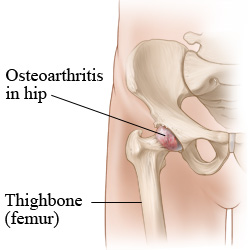
Overview
Arthritis, also called osteoarthritis, is a breakdown of the tissue (cartilage) that cushions your joints. Many people have some arthritis as they age. When the cartilage in your hip joints wears down, your hip bone rubs against the hip socket. This causes pain and stiffness.
Work with your doctor to find the right mix of treatments for your arthritis. There are things you can do at home to protect your hip joints, ease your pain, and help you stay active. But if your arthritis becomes so bad that you cannot walk, you may need surgery to replace the hip joint.
Follow-up care is a key part of your treatment and safety. Be sure to make and go to all appointments, and call your doctor if you are having problems. It's also a good idea to know your test results and keep a list of the medicines you take.
How can you care for yourself at home?
- Stay at a healthy weight. Being overweight puts extra strain on your hip joints.
- Talk to your doctor or physical therapist about exercises that will help ease hip pain. These tips may help.
- Stretch to help prevent stiffness and to prevent injury before you exercise. You may enjoy gentle forms of yoga to help keep your joints and muscles flexible.
- Walk instead of jog. Other types of exercise that are less stressful on the joints include riding a bike, swimming, and doing water exercise.
- Lift weights. Strong muscles help reduce stress on your joints. Stronger thigh muscles, for example, take some of the stress off of the knees and hips. Learn the right way to lift weights so you do not make joint pain worse.
- Take pain medicines exactly as directed.
- If the doctor gave you a prescription medicine for pain, take it as prescribed.
- If you are not taking a prescription pain medicine, ask your doctor if you can take an over-the-counter medicine.
- Use a cane, crutch, walker, or another device if you need help to get around. These can help rest your hips. You also can use other things to make life easier, such as a higher toilet seat.
- Do not sit in low chairs, which can make it painful to get up.
- Put heat or cold on your sore hips as needed. Use whichever helps you most. You also can go back and forth between hot and cold packs.
- Apply heat 2 or 3 times a day for 20 to 30 minutes—using a heating pad, hot shower, or hot pack—to relieve pain and stiffness.
- Put ice or a cold pack on your sore hips for 10 to 20 minutes at a time to numb the area. Put a thin cloth between the ice and your skin.
- Think about talking to your doctor about using capsaicin, a cream you apply to the skin for pain relief.
When should you call for help?
Call your doctor now or seek immediate medical care if:
- You have sudden swelling, warmth, or pain in any joint.
- You have joint pain and a fever or rash.
- You have such bad pain that you cannot use the joint.
Watch closely for changes in your health, and be sure to contact your doctor if:
- You have mild joint symptoms that continue even with more than 6 weeks of care at home.
- You do not get better as expected.
- You have stomach pain or other problems with your medicine.
Where can you learn more?
Go to http://www.healthwise.net/patientEd
Enter T640 in the search box to learn more about "Hip Arthritis: Care Instructions".
Current as of: July 31, 2024
Author: Ignite Healthwise, LLC Staff
Clinical Review Board
All Healthwise education is reviewed by a team that includes physicians, nurses, advanced practitioners, registered dieticians, and other healthcare professionals.

